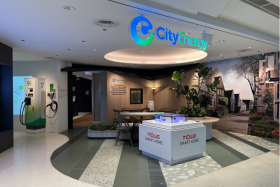Turning trash into treasure with new tech
Plan to install mobile plastic upcycling system in malls here
After mere minutes of use, single-use plastics such as cups, straws and bottle caps end up in landfills or on beaches.
But National Geographic Emerging Explorer Arthur Huang, 41, and his team at his company Miniwiz have developed a way to give these plastics a new lease of life, as fabrics, crockery, building materials, even airplane parts.
To understand our recycling ecosystem, Mr Huang, who is in Singapore for the #RecycleRight campaign by National Geographic and the Ministry of Environment and Water Resources, visited key sites including the Semakau Landfill and Sembcorp’s Materials Recovery Facility.
Trained in engineering, Mr Huang has been a National Geographic Emerging Explorer since 2016, turning post-consumer waste into innovative products.
MAXIMISE
Mr Huang, who was born in Taiwan, said that as a city, Singapore should tap into urban resources, learn to maximise what we have and find a way to turn trash into something usable and beautiful.
Most of the plastic waste here is incinerated as it is difficult to recycle, because of logistics and contamination issues.
Mr Huang said: "Traditionally, we talk about recycling as a multi-billion-dollar plan."
He said traditional methods of recycling plastic requires manpower of several hundred workers, from start to finish.
He said: "The problem in Singapore is that people throw everything into the recycling bins, contaminating the recyclable trash. Even in the transportation of the rubbish, more contamination can take place."
That is why Mr Huang and his team conceptualised the Trashpresso, a mobile plastic upcycling system that allows for waste to be recycled in about five steps.
Mr Huang said the individual will be incentivised to sort trash into the right pocket.
The plastic will then be shredded, heated to the right temperature until it is moldable and pressed into a mold of the user's choice, such as a bowl, phone case or even furniture parts.
Mr Huang, whose company has about 70 employees in Milan, Taipei, Beijing and Singapore, told The New Paper that Miniwiz is in discussions with some organisations and malls in Singapore, to have the latest version of the Trashpresso up and running in commercial spaces here later this year.
Mr Huang added that many people vilify plastic, but it is actually one of the most useful materials - if used right.
"Plastic in itself is not toxic, it is non-reactive. Now, as our natural resources are running out and trash in the landfills is piling up, we need to look to the plastic we already have as a new resource," he said.
"The Garden City has its limits. The question is how can we use our consumption as a new-generation resource, and turn pollution into beauty."
Get The New Paper on your phone with the free TNP app. Download from the Apple App Store or Google Play Store now



